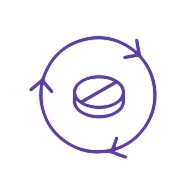- Private & confidential service
- Genuine medication
- All-inclusive service - No hidden fees
- Next day delivery
Morning After Pill
Start your consultation

- 98% effective up to 5 days
- Discreet online process
- Free next-day delivery

- 85-95% effective in first 24 hours
- Confidential online service
- Free next day delivery

- Same active ingredient as Levonelle
- 85-95% effective in first 24 hours
- Free next-day delivery
Morning After Pill
Mistakes happen from time to time. A condom breaks or a pill is missed. Once in a while, it can happen to anyone. Thankfully, emergency contraception is available and highly effective. The most accessible form of emergency contraception is the emergency contraceptive pill, also known as the morning after pill. You can buy the morning after pill online with free next-day delivery at HealthExpress.
Topics
What is the morning after pill?
The morning after pill is an emergency contraceptive pill that, when taken within a few days after unprotected sex, will protect you from becoming pregnant. There are two types of morning after pill: levonorgestrel ( Levonelle or Plan B) and ulipristal pills ( ellaOne or ella).
They both work by preventing ovulation (the release of an egg from your ovary) but work in slightly different ways. They do not work if you are already pregnant and morning after pills cannot terminate a pregnancy.
How does the morning after pill work?
The morning after pill works by preventing ovulation, thereby preventing the release of an egg from your ovary. This means there is no egg for the sperm to fertilise and you cannot get pregnant. Each pill has its own mechanism of action.
Levonorgestrel pills
Levonorgestrel is a synthetic progesterone and is also an ingredient in several birth control pills and brands of the intrauterine system (IUS). It delays ovulation by affecting progesterone levels. More specifically, it mimics the rising levels of progesterone after you ovulate.
This tricks your brain into thinking you have ovulated. Therefore, your body doesn’t produce key hormones that prepare your ovary to release an egg into your fallopian tube.
Ulipristal acetate pills
Unlike levonorgestrel, ulipristal acetate is not a synthetic hormone. Rather, it is a selective progesterone receptor modulator.
What it does is it binds to the progesterone receptors in your body and blocks the effects of the hormone. By doing so, this prevents ovulation and decreases the thickness of the endometrium (the lining of the uterus).
When should I take the morning after pill?
While called “the morning after pill”, you don’t have to take it the morning after. You can take levonorgestrel pills up to 3 days after unprotected intercourse, whilst with ulipristal acetate pills, you can wait up to 5.
However, you should always take it as soon as possible. How effective a pill is after unprotected sex will significantly reduce the longer you wait to take it. So whilst you strictly don’t have to take it the second after the event happens, you will have better chances if you take it as soon as possible.
How often can I use the morning after pill?
You can take the morning after pill multiple times throughout your cycle, however, this is not an effective form of contraception in the long-term because the method relies on you not having ovulated. It also can affect your menstrual cycles in the long-term.
Moreover, if you need to use the morning after pill twice within 7 days, make sure it is the same type of pill. Your emergency contraception will be less effective if you use a levonorgestrel and ulipristal pill in the same week.
If you find you are using the morning after pill fairly regularly, it might be worth considering switching to another method of contraception that is more convenient for you.
What are the benefits of taking the morning after pill?
 Easily obtainable
Easily obtainableAs emergency contraception needs to be taken quickly to be most effective, they are easy to obtain online or from a sexual health clinic
 High effectiveness
High effectivenessknown to be around 95-98% effective if used within 24 hours
 Easy to use
Easy to useIt is just a one dose tablet to be taken as soon as possible
 Reduces abortion rates
Reduces abortion ratesGoing through an abortion takes an emotional and physical toil. Using the morning after pill means you avoid this stage completely
How effective is the morning after pill?
Both morning after pills are highly effective at preventing pregnancy, with research finding that only 1 - 3.6% of women become pregnant after taking them.
However, the sooner you take it, the more likely it will work. This is because the longer you wait to take it, the more likely it is you will ovulate by the time you have taken the morning after pill. The emergency contraceptive pill will not work if you have already ovulated.
Even if you take the morning after pill perfectly, other factors can alter its efficacy. For instance, certain medicines such as sedatives, anti-seizure medicines, antibiotics and antifungals can all reduce the effectiveness of the morning after pill. So it’s important you tell whoever is prescribing or selling it to you your medical history.
Are there any risks when taking the morning after pill?
The morning after pill is suitable for most women who have had unprotected sex. Unlike other contraceptives, the long-term risks are very rare, since you only take it as and when you need it. So any risk of blood clots or gynaecological problems is significantly low.
However if you have severe asthma, liver disease or any other medical condition, you should always check if you can take a morning after pill as you may be at a slightly increased risk of side effects. You should also check with your doctor if you take any other medicines.
The good news is, even if you are sensitive to regular hormonal contraceptives such as the pill or the mini-pill, you can take the morning after pill. It is also suitable to take if you are breastfeeding.
Does the morning after pill affect my normal contraception?
If you take a hormonal contraceptive and then use emergency contraception, your usual contraceptive will be affected.
After taking a levonorgestrel pill, you should take your next contraceptive pill, apply a new patch or insert a ring within 12 hours of using it. If you take a ulipristal acetate pill, you must wait 5 days before continuing your regular contraception.
You also will need to use a barrier contraceptive for a couple of days after using an emergency pill. How long will depend on the contraceptive you use:
- 7 days if you use the patch, ring or combined pill (except Qlaira)
- 9 days if you use the combined pill Qlaira
- 2 days if you use the progestogen-only pill
Are there any other forms of emergency contraception?
If the morning after pill doesn’t work for you or you’re not able to take it, you can use the intrauterine device (IUD), sometimes known as the copper coil.
If inserted within 5 days of unprotected sex, the copper IUD can prevent an unintended pregnancy. In fact, the IUD is the most effective form of emergency contraception. One study found that only 1 in every 1,000 women using it for emergency contraception become pregnant.
Once inserted, it can be left in and used as your permanent contraception or you can choose to have it removed during your next period.
You cannot use the hormonal IUD, known as the intrauterine system (IUS), for emergency contraception.
What happens if the morning after pill doesn’t work?
A common side effect of the morning after pill is that your next period may be earlier or later than usual. However, if your period is more than 7 days late, or it is unusually light or heavy, it could be a sign you are pregnant. You should take a pregnancy test as soon as possible.
If you find that you are pregnant, the morning after pill will not work to prevent it. You should consult with your doctor to discuss your options.
Where can I get the morning after pill?
The morning after pill is available for free at contraception clinics, sexual health clinics and from some NHS GPs and pharmacies. Otherwise, it’s available to buy over the counter at most pharmacies.
It’s also available online at HealthExpress, delivered with free next-day delivery to ensure you can take it as soon as possible. You can also buy up to 2 tablets at a time, so you can keep an extra on hand for if it happens again.
3 simple steps to get you started











